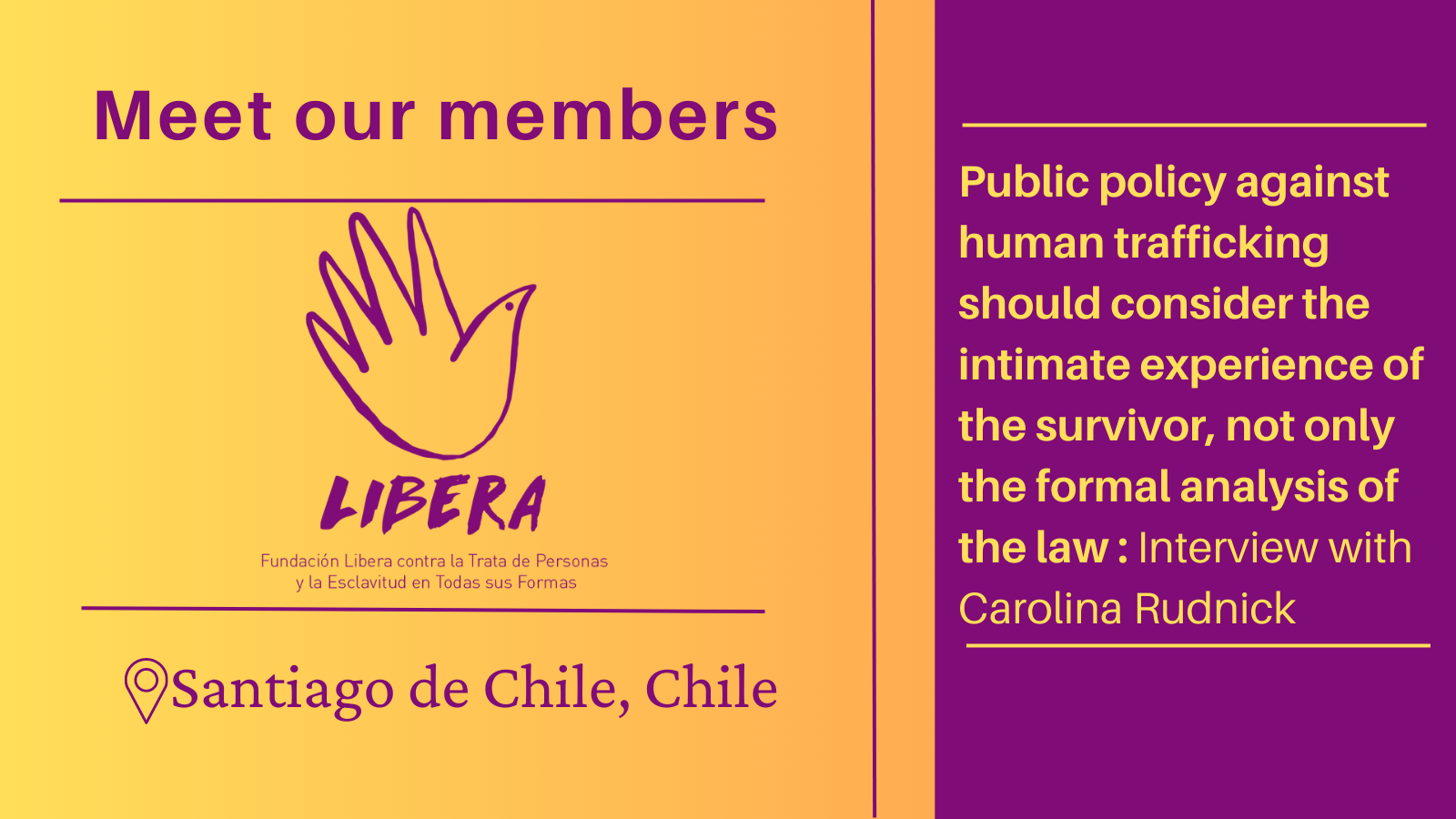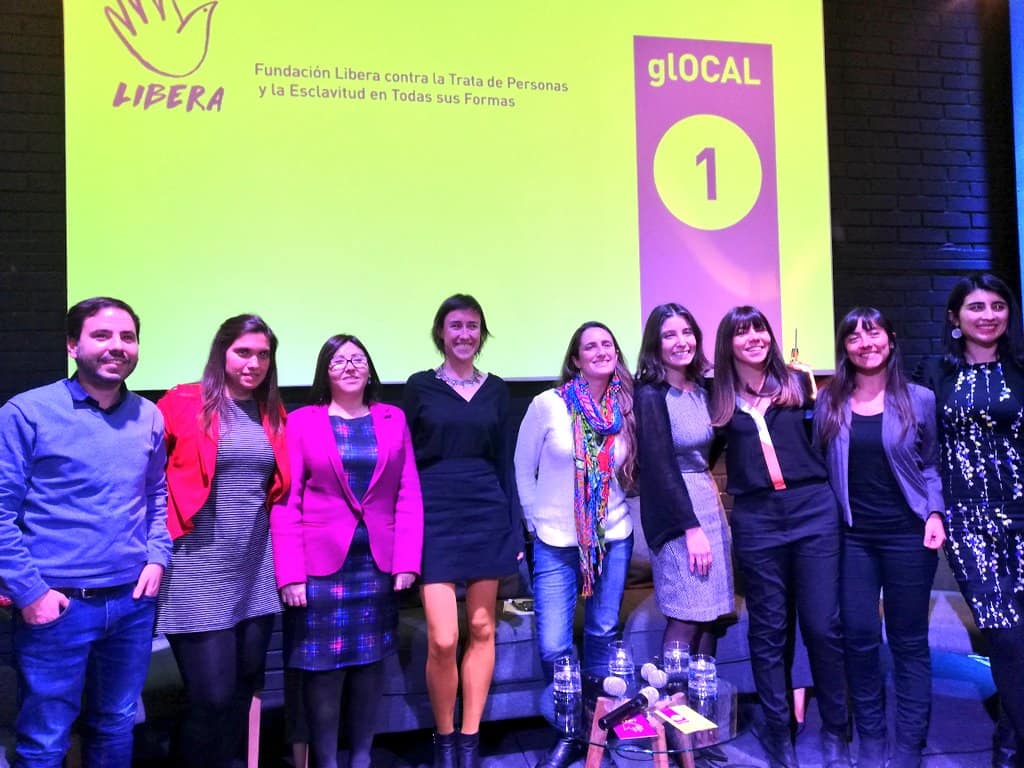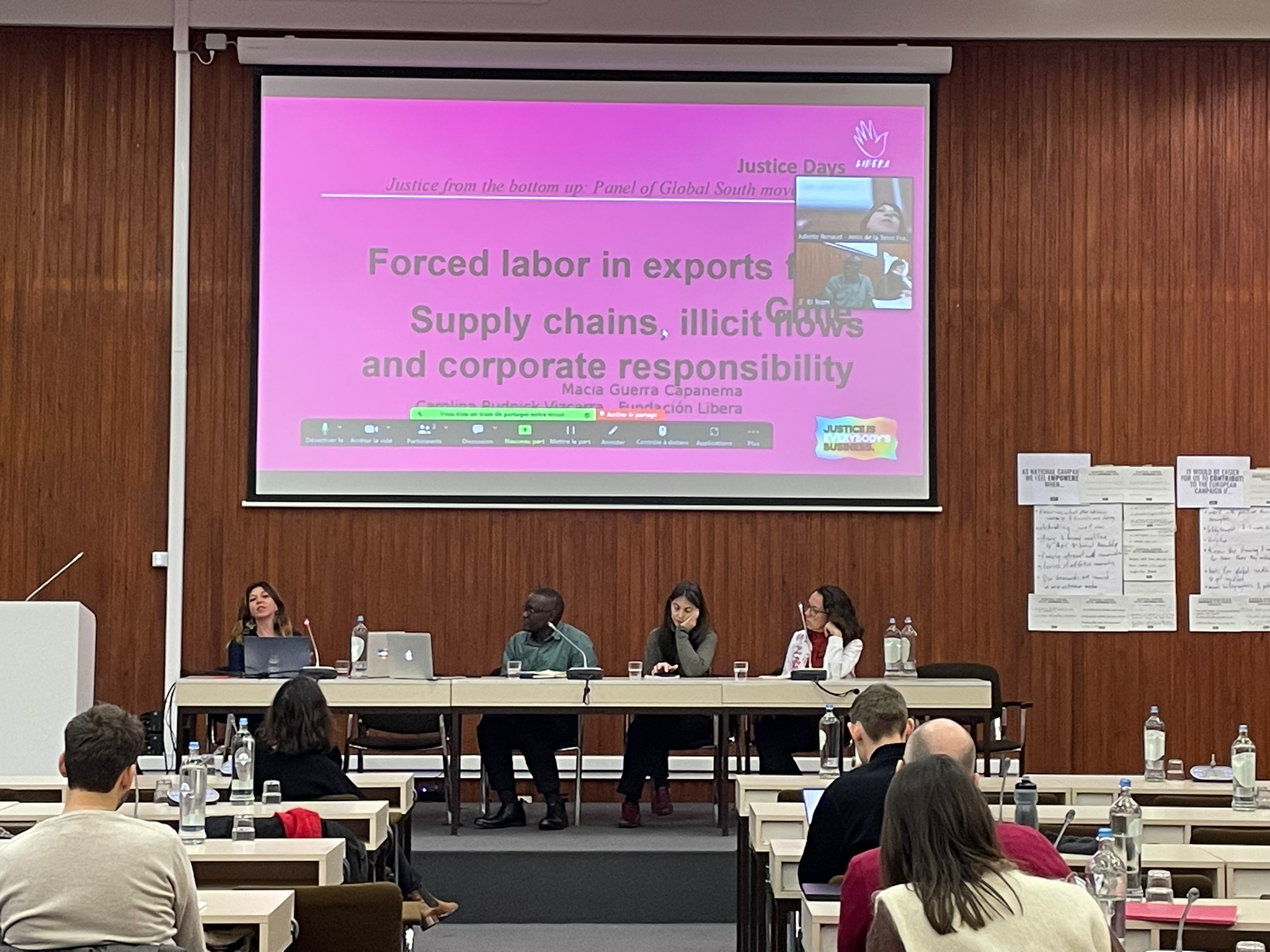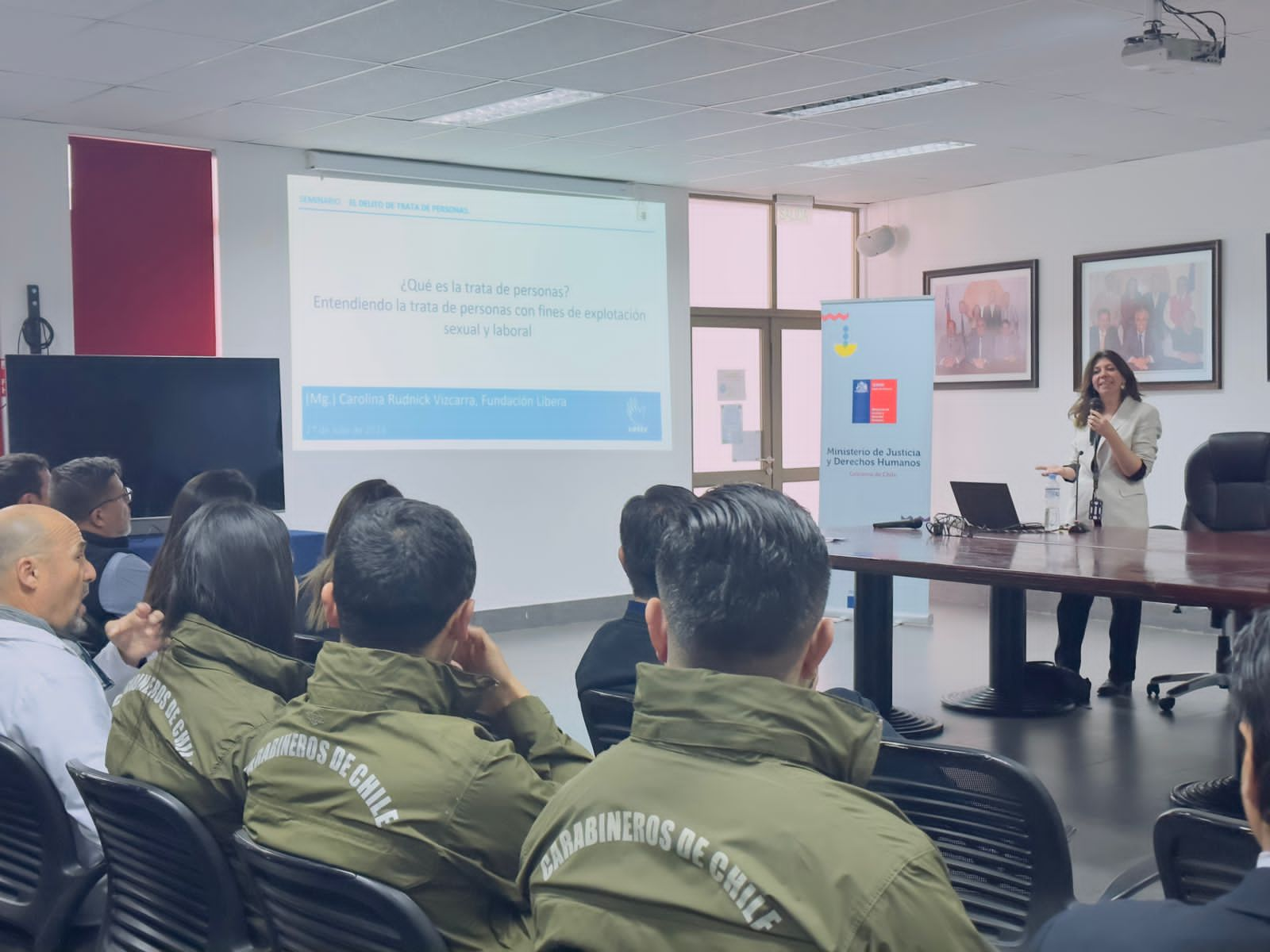Public policy against human trafficking should consider the lived experiences of survivors

Fundación Libera is a GAATW member in Chile. Vivian Cartagena from the GAATW Secretariat conducted this interview with the organisation’s founder, Carolina Rudnick, in July 2023 to better understand their work, history and context. The interview was conducted in Spanish and translated into English.
Leer la entrevista en español aquí.
Vivian: Welcome Carolina, thanks for taking the time to tell us more about Fundación Libera. When and how was Fundación Libera created?
Carolina: Libera was formally founded in December 2016, but we had already started working in 2015. What triggered the founding of Libera were the evident gaps in the State´s response to detecting and addressing human trafficking in Chile. Libera was founded by former public officials who had to work on the first Action Plan on Anti-Trafficking in 2013. Many of us were public officials or representatives from international organisations. We helped create a public policy on this matter, as well as the first care protocols, and research. We created the Regional Anti-Trafficking Committees throughout Chile and we conducted trainings for officials. After making this formal implementation, we made significant progress such as improving Chile's rating in the TIP Report of the United States Department of State. After the creation of the Action Plan, Chile rose from Tier 2 to Tier 1.
However, we faced situations and cases where unfortunately we couldn't protect the victims adequately.
These mistakes prompted us to understand that we had to take additional steps and create a civil society organisation that could go along with the State and generate the awareness that was lacking. In this sense, Fundacion Libera was established in 2016, with our efforts gradually picking up momentum in 2017. By 2018, we were empowered when we realized that a comprehensive approach was necessary. We also realised that it was important to not just involve state services, but also the business community, universities, and the youth. From there, we launched the first comprehensive glOCAL program (TheGlobalXTheLocal Program) that sought to bring all the knowledge that was being developed many years ago by civil society in Chile and Latin America.

Vivian: Could you tell us more about this idea of "taking an extra step" as a non-profit organisation? Do you think there were limitations to doing this task from the public?
Carolina: Civil society has a very valuable flexibility, in terms of generating and creating a cultural movement. The fight against trafficking and contemporary slavery is a social movement because it requires an evolution in the understanding of social phenomena and we were very interested in being able to generate research and to make alliances with other NGOs. Also, doing the work as part of civil society meant having a psycho-social approach to the victims, as it is valuable to us. Global studies indicate that civil society has major influences on improvements in public policy across all nations
Previously, civil society had not yet developed an approach to combat trafficking that focuses on labour exploitation. The prevailing viewpoint heavily addressed sexual exploitation (i.e. forced prostitution), which was undoubtedly a major issue as it was considered the root cause of trafficking. However, we came to observe that many issues of modern slavery in the country were overlooked and we saw the need to establish this organisation that could work with groups that were not getting assistance on the ground.
On the other hand, for certain vulnerable groups (e.g. irregular migrants) the State can be intimidating. That is why we also considered it important to create bridges that are supportive, and could recognise the demands of marginalised groups who have been objects of rights violations by the State. For example, in cases in which the State doesn't detect a victim, when the State doesn't register a complaint, or when the State detects a victim but doesn't give him/her adequate treatment in its interrogations or in its demand to participate in criminal proceedings, it all builds resistance and can re-traumatize.
Therefore, it seemed appropriate for us to train ourselves to generate that golden bridge between the victims, the social movement, and the State, which tends to be seen as a hostile agent.
Vivian: Yes, and the current proceedings can revictimise the victims and survivors.
Carolina: Exactly, and that's what we were able to demonstrate in these cases. Revictimization is over. It is also necessary to understand the results of the studies on how public officials are part of the general society, and therefore, they also have these stereotypes about victims and survivors.
From this perspective, it seemed important to us to break down these discriminations and stereotypes.
Vivian: And in that sense, what are the main issues that you focus on? For example, you have mentioned that research is important, influencing stereotypes, among others. What are your main programme areas?
 Carolina: By statute, Libera addresses trafficking in all its exploitative purposes, and to fulfill our mission of eradicating human trafficking and contemporary forms of slavery in Chile and Latin America, we basically unfold our mission in six lines of work. These are the dissemination of information for the general population; basic and specialised trainings for justice operators; research, as it is necessary to investigate types of crime - how this is happening, the phenomenology of the victims, as well as to investigate the mistakes and damages into which the state mechanisms fall. The fourth line has to do with direct assistance to victims, i.e. free legal representation in trafficking cases. This area is very important because, although the prosecutors have the duty to protect the victims, it is also established academically that it is judicial protection and direct judicial representation by a complainant of the victim that allows progress in criminal proceedings. Our fifth line is the generation of networks for national and international legislative advocacy. Indeed, the collaboration with NGOs from other countries and, in that sense, the fact of being part of the Latin American network of GAATW is an honour and a joy for us, it is a light in our work. It is key to advancing our advocacy. In other words, collaboration between networks that can support these legislative and social advances in public policies is crucial in our work.
Carolina: By statute, Libera addresses trafficking in all its exploitative purposes, and to fulfill our mission of eradicating human trafficking and contemporary forms of slavery in Chile and Latin America, we basically unfold our mission in six lines of work. These are the dissemination of information for the general population; basic and specialised trainings for justice operators; research, as it is necessary to investigate types of crime - how this is happening, the phenomenology of the victims, as well as to investigate the mistakes and damages into which the state mechanisms fall. The fourth line has to do with direct assistance to victims, i.e. free legal representation in trafficking cases. This area is very important because, although the prosecutors have the duty to protect the victims, it is also established academically that it is judicial protection and direct judicial representation by a complainant of the victim that allows progress in criminal proceedings. Our fifth line is the generation of networks for national and international legislative advocacy. Indeed, the collaboration with NGOs from other countries and, in that sense, the fact of being part of the Latin American network of GAATW is an honour and a joy for us, it is a light in our work. It is key to advancing our advocacy. In other words, collaboration between networks that can support these legislative and social advances in public policies is crucial in our work.
Finally, the last approach is the promotion of freedom with regard to the empowerment of vulnerable groups. We consider that the fight against trafficking and contemporary slavery has to do with state action, but it also has to do with sensitization and with raising awareness among vulnerable groups that are susceptible to arrest and detention. That's our approach to trafficking.
On the other hand, the vast majority of NGOs that address the issue of trafficking in Chile do so in its aspect of sexual exploitation. That's why three years ago we have been addressing trafficking for labour exploitation as a priority. We have identified that trafficking and forced labour is taking place with great force in the most important economic sectors of Chilean society such as agriculture, aquaculture, construction, restaurants, and services, and it seemed crucial to us to influence this aspect that wasn't taken into account.
Vivian: What are the main dynamics and the biggest challenges in the current context, not only in relation to the risk of human trafficking but also in terms of migration to Chile?
Carolina: Most of the victims of trafficking in Chile are foreigners. In this context, there is a trend of the connection between migration and the danger of forced migration with the risk of being a victim of trafficking. I could say that there has been an evolution in this crime.
In 2012, Chile began to experience a migratory boom of Peruvian and Bolivian citizens. After 2016, there was a migratory flow of Haitian citizens, and from 2017 and in 2018, the migratory flow of Venezuelan citizens began. These migratory flows were traversed by trafficking. In effect, we are referring to people who had plans of migration and were used by traffickers who brought them to Chile to be exploited. In the research that we carried out, we realised that Haitian citizens were subjected to labour exploitation in agriculture, just as Venezuelan citizens were also subjected to forced labour in restaurants, domestic work, and agriculture. Unfortunately, during those years this was not identified as such; but only cases of trafficking for the purpose of sexual exploitation of Colombian and Dominican women.
 Currently, there is an increase in organised crime activities from known gangs, such as the Tren de Aragua, which are effectively recruiting Venezuelan women and subjecting them to sexual exploitation. Very serious cases of a large number of women who are exploited by these gangs have recently been exposed. In this regard, the trends of the latest United Nations report on Trafficking, regarding violence against women and girls, reflect the current situation.
Currently, there is an increase in organised crime activities from known gangs, such as the Tren de Aragua, which are effectively recruiting Venezuelan women and subjecting them to sexual exploitation. Very serious cases of a large number of women who are exploited by these gangs have recently been exposed. In this regard, the trends of the latest United Nations report on Trafficking, regarding violence against women and girls, reflect the current situation.
Another aspect that we have been able to observe is the irregular migration of workers. Their migration and economic conditions make them vulnerable to being victims of false job offers and abusive working conditions.
In summary, we are very concerned about organised crime where there is also a call at the social level regarding the demand for commercial sex.
Additionally, we are also concerned about the cases of trafficking and forced labour in legitimate economic sectors where the recruitment of irregular migrant workers is constant through intermediaries and contractors.
Vivian: In relation to people with whom you work, whether through awareness raising and sensitization in the communities, but also through the legal services that you offer - How do you incorporate the perspectives and lessons learned from women and children that are survivors of human trafficking into your work?
Carolina: We do it in various ways. The experience of the people we represent is present in our work, and in our reports, and also influences our public policy proposals to the state. In turn, we call on the people we represent to attend meetings that we hold so that they can share their experiences. We make a lot of links with civil society organisations in our country, for example, with migrant and pro-migrant associations, and farmworker unions, and there we have a reciprocal dialogue. That is, we try to achieve empowerment through the promotion of rights. In fact, the community of migrant workers and citizens are surprised by the number of rights they have under the law.
In this respect, there is a dialogue and mutual learning because we can deliver that knowledge, and at the same time, the attendees can give us their knowledge and experience, which we use to influence public policies, legislative reforms, changes in protocols, etc.
The experiences of survivors are crucial. In other words, what public policy should consider is the lived experiences of survivors, and not only the analysis of the law. This absence of focus on the victim is precisely what we observe in the failures of the judicial system and criminal prosecution. There isn't a dynamic of putting yourself in the other's place, and that is why cases are constantly processed with the notion of the ideal victim. Victims of trafficking are not ideal victims. They are people with a lot of personality, very brave, but who face structural limitations where it ends up being the state itself that imposes conditions of subordination and dependency.
 Vivian: Exactly, and those are the current challenges around effective access to justice, and inadequate support for victims from the authorities because there are organisations like Libera that provide these services, but in the end, it is the responsibility of the state itself to protect these victims and/or survivors. As Latin America we currently share that challenge, as well. Carolina. I don't have any more questions. Is there anything you would like to add about your work or future perspectives and challenges?
Vivian: Exactly, and those are the current challenges around effective access to justice, and inadequate support for victims from the authorities because there are organisations like Libera that provide these services, but in the end, it is the responsibility of the state itself to protect these victims and/or survivors. As Latin America we currently share that challenge, as well. Carolina. I don't have any more questions. Is there anything you would like to add about your work or future perspectives and challenges?
Carolina: One of the challenges for the future would undoubtedly be the strengthening of the international movement in this matter. At this moment, worldwide, there is a broad agenda and a movement that is emphasising the responsibility of the private sector in the existence of cases of trafficking and forced labour. This is what has been called the Business and Human Rights Agenda, which reflects the need for laws that impose due diligence obligations. That is, that the private sector can identify, prevent, mitigate, and remedy the risks of violation of human rights in its operations and supply chains. This is an agenda that must be connected with the Anti-Trafficking and Modern Slavery Agendas.
Likewise, this synergy between different human rights agendas is very valuable and we believe that it is a beautiful moment to reinforce this international collaboration between civil society to allow us to reinforce a wonderful concept that is 'universal solidarity'.
Vivian: Thank you very much for this conversation and for your time, Carolina. It has been a pleasure to understand more about the work of Fundación Libera.

